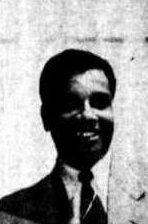Clyde Walcott facts for kids
 |
||||||||||||||||||||||||||||||||||||||||
| Personal information | ||||||||||||||||||||||||||||||||||||||||
|---|---|---|---|---|---|---|---|---|---|---|---|---|---|---|---|---|---|---|---|---|---|---|---|---|---|---|---|---|---|---|---|---|---|---|---|---|---|---|---|---|
| Full name |
Clyde Leopold Walcott
|
|||||||||||||||||||||||||||||||||||||||
| Born | 17 January 1926 Saint Michael, Barbados |
|||||||||||||||||||||||||||||||||||||||
| Died | 26 August 2006 (aged 80) Barbados |
|||||||||||||||||||||||||||||||||||||||
| Height | 6 ft 2 in (1.88 m) | |||||||||||||||||||||||||||||||||||||||
| Batting | Right-handed | |||||||||||||||||||||||||||||||||||||||
| Bowling | Right-arm fast-medium | |||||||||||||||||||||||||||||||||||||||
| Role | Wicket-keeper | |||||||||||||||||||||||||||||||||||||||
| International information | ||||||||||||||||||||||||||||||||||||||||
| National side | ||||||||||||||||||||||||||||||||||||||||
| Test debut (cap 58) | 21 January 1948 v England | |||||||||||||||||||||||||||||||||||||||
| Last Test | 31 March 1960 v England | |||||||||||||||||||||||||||||||||||||||
| Domestic team information | ||||||||||||||||||||||||||||||||||||||||
| Years | Team | |||||||||||||||||||||||||||||||||||||||
| 1941–1956 | Barbados | |||||||||||||||||||||||||||||||||||||||
| 1954–1964 | British Guiana | |||||||||||||||||||||||||||||||||||||||
| Career statistics | ||||||||||||||||||||||||||||||||||||||||
|
||||||||||||||||||||||||||||||||||||||||
|
Source: CricketArchive, 8 January 2009
|
||||||||||||||||||||||||||||||||||||||||
Sir Clyde Leopold Walcott (born January 17, 1926 – died August 26, 2006) was a famous West Indian cricket player. He was one of the "three W's," a group of three amazing batsmen from Barbados. The other two were Everton Weekes and Frank Worrell. All three were born close to each other in Bridgetown and started their Test cricket careers against England in 1948.
In the mid-1950s, many people thought Walcott was the best batsman in the world. After he stopped playing, he became a very important person in cricket administration. He was the first chairman of the International Cricket Council who was not from England and was not white.
Contents
About Clyde Walcott
Clyde Walcott was born in Bridgetown, Barbados. His father worked for a newspaper. Clyde went to Combermere School and later to Harrison College. At Harrison College, he started playing as a wicket-keeper and also learned to bowl.
In 1951, he married Muriel Ashby, and they had two sons. His brother, Keith, and his son, Michael, also played first-class cricket for Barbados.
Clyde Walcott's Cricket Career
Walcott began playing first-class cricket for Barbados in 1942 when he was only 16 years old. He made a huge impression in 1946. He scored an amazing 314 runs without being out for Barbados against Trinidad. He and his friend Frank Worrell (who scored 255 not out) made a world record partnership of 574 runs. This record still stands in the West Indies!
He played his first Test match in January 1948 against England. Walcott was a strong player, standing 6 feet 2 inches tall. He was very good at hitting the ball hard. For his first 15 Test matches, he also played as a wicket-keeper. This showed how versatile he was. Later, a back injury stopped him from wicket-keeping. But by then, his batting was so good that he kept his place in the team. He also became a good fielder and sometimes bowled fast-medium.
In 1950, Walcott scored 168 runs not out in a match at Lord's. This helped his team win their first Test match and series in England. In 1955, he made history by scoring a century (100 runs) in both innings of two different Tests against Australia. He was the first batsman to score five centuries in one Test series, getting 827 runs in 10 innings. He was only out for a duck (0 runs) once in his Test career.
From 1951 to 1954, he played for Enfield in the Lancashire League. In 1954, he moved to Georgetown, Guyana (then British Guiana). There, he coached cricket for sugar producers. He also played first-class cricket for British Guiana and became their captain by 1956. He later returned to Barbados in 1970.
In 1958, he was named a Wisden Cricketer of the Year, which is a big honor in cricket.
Life After Playing Cricket
Walcott stopped playing Test cricket in 1960. He retired from first-class cricket in 1964. In 1966, he received the OBE award for his great contributions to cricket in Barbados, Guyana, and the West Indies.
After retiring from playing, Walcott became a very active cricket administrator. He managed and coached many cricket teams. He was also a cricket commentator in Barbados. From 1973 to 1988, he was the chairman of the West Indies selectors. He managed the West Indies teams that won the Cricket World Cup in 1975 and 1979. He also managed the team in 1987.
From 1988 to 1993, he was the president of the West Indies Cricket Board. In 1991, he received the Gold Crown of Merit from Barbados. In 1993, he became a Knight of St Andrew.
He finished his career at the International Cricket Council (ICC). In 1993, he became the chairman of the ICC. He was the first person who was not English and the first black person to hold this important position. He was knighted for his services to cricket in 1994. The other "Ws," Weekes and Worrell, were also knighted. In 1997, he became the ICC Cricket Chairman. He was in charge of the ICC Code of Conduct and looked into claims of match fixing. He retired in 2000.
In 2006, when footballer Theo Walcott was chosen for the England football team, some people thought he might be related to Sir Clyde. But Sir Clyde said they were "definitely not a relative."
Sir Clyde Walcott wrote two books about his life in cricket: Island Cricketers (1958) and Sixty Years on the Back Foot (1999). After he passed away, Michael Holding, a famous West Indian bowler, said that Sir Clyde was "not only a West Indies legend but a legend of the world."
Images for kids
 | James Van Der Zee |
 | Alma Thomas |
 | Ellis Wilson |
 | Margaret Taylor-Burroughs |


